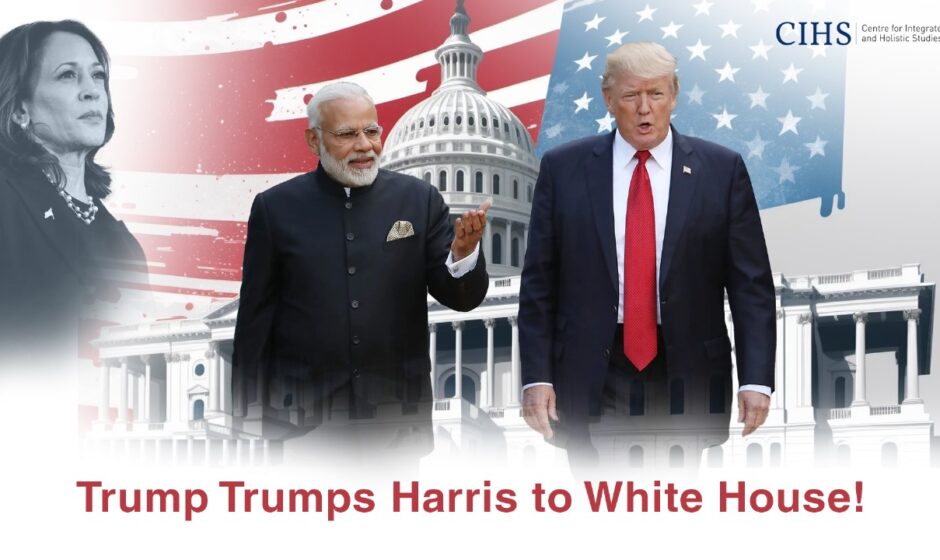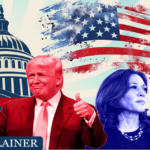Choices made at this critical juncture will undoubtedly shape future of US and Bharat, global order. World watches with keen interest as these two powerful democracies cruise ahead.
Rahul Pawa
In a stunning political slugfest marked by fervent debates and impassioned rallies, Donald Trump emerged victorious in United States presidential election reclaiming White House.

Even as Trump romped home, widespread anticipation and speculation about implications for both United States and its global relationships continued far and wide. As dust settles from a heated, nerve wracking electoral battle, the narrative of Trump’s second term begins to take shape, weaving a complex web of promises and projections that could redefine America’s role on the world stage, particularly regarding its strategic partnership with India.
With a renewed mandate, Trump steps back into office bringing with him a resolute commitment to an “America First” agenda that’s loosely designed on lines of ‘India First’ policy framework of Indian government under Prime Minister Narendra Modi.
This mantra resonates deeply with Trump’s supporters who yearn for robust American presence in global affairs. His approach to foreign policy is characterized by determination to strengthen ties with India, a country he recognizes as essential to US strategic interests in an increasingly multiplex geopolitical landscape. By sidestepping criticisms of India’s internal matters—particularly concerning Jammu and Kashmir—Trump positions himself as a steadfast ally, respecting India’s sovereignty while forging a deeper partnership.
One of the hallmarks of Trump’s presidency is his focus on national security and his victory sets the stage for robust collaboration with India on counter-terrorism. Trump has long championed the importance of addressing security threats emanating from Pakistan, a stance that aligns closely with India’s own challenges.
His administration’s commitment to enhancing intelligence-sharing and joint operations signifies serious approach to addressing terrorism. This proactive alignment may fortify both the nation’s defences providing a united front against shared adversaries. As the world grapples with complexities of security threats, this partnership could emerge as a crucial alliance in maintaining stability in the region.
Trade relations are another area poised for significant enhancement under Trump’s leadership. His pro-business policies aim to dismantle trade barriers and promote investment, creating a favourable environment for economic cooperation. American businesses are eager to tap into India’s burgeoning market, which promises growth opportunities across various sectors, from technology to agriculture. Trump’s focus on reducing regulatory hurdles could lead to a surge in bilateral trade, fostering economic integration that benefits both countries. This approach stands in contrast to Kamala Harris’s proposed policies, which might have introduced stricter regulations and compliance standards that could complicate trade dynamics.
Culturally, Trump’s presidency is likely to strengthen the ties between United States and India. His vocal advocacy for religious freedoms resonates within the context of India’s pluralistic and inclusive society. By condemning religious persecution and supporting rights of Hindus globally, Trump aligns himself with India’s efforts to promote global inclusivity. This commitment could foster goodwill between the two nations, enhancing their cultural exchange and mutual understanding. In contrast, Harris’s approach, while supportive of human rights, may not have addressed the specific challenges faced by different communities in India, particularly Hindus, potentially limiting the depth of the relationship.
Geopolitical relations become increasingly competitive especially with Chinese Communist Party’s rising influence in the Indo-Pacific region. Trump administration emphasizes the need for a strong military presence to counterbalance this threat. His advocacy for the Quad alliance—comprising United States, India, Japan, and Australia—demonstrates a commitment to collective security and stability. This alliance represents a strategic partnership that is likely to enhance India’s standing in the region while ensuring that the US remains a significant player in the Indo-Pacific. In contrast, Harris’s diplomatic approach may have leaned towards multilateral engagement focusing on dialogue without same level of assertiveness that many view as necessary in countering regional threats.
As Trump navigates complexities of his second term, implications for US -India relations become will become increasingly clearer. His administration’s focus on economic cooperation, security collaboration, and cultural understanding are expected to build a framework for partnership poised to thrive in the coming years. The world watches closely, recognising that the choices made during this administration will resonate far beyond the borders of both nations.
In this new chapter, Trump’s victory signifies more than just a personal triumph; it represents a decisive shift toward a more assertive foreign policy, one that embraces partnerships grounded in shared interests and mutual respect. The journey ahead is illuminated by the shared aspirations of two democracies ready to engage with the complexities of a changing world.
Looking ahead, the potential for transformative collaboration between United States and India is immense. As both nations navigate the challenges of the 21st century, they stand at the forefront of a new era of global engagement. The combination of Trump’s commitment to economic revitalization and national security, along with India’s ambitions on global stage, creates an opportunity for powerful partnership that can address the pressing issues of our time.
As the Trump administration sets its agenda, it is clear that India will play a central role in U.S. foreign policy. The historical ties between the two nations, steeped in shared democratic values and mutual respect, provide a strong foundation for a future characterised by collaboration. The potential for joint initiatives in emerging technology, defense, and climate change is vast, and as both countries seek to assert their influence on the global stage, the U.S.-India partnership will be a critical component of that strategy. Furthermore, Trump’s approach to governance may resonate well with India’s leadership style, fostering a sense of camaraderie that extends beyond mere political manoeuvring. As both leaders navigate the complexities of domestic and international challenges, their ability to forge a strong working relationship could yield significant benefits for their respective countries and the broader global community.
As Donald Trump embarks on second term, the implications for US -India relations are profound. The potential for a transformative partnership, built on shared interests and mutual respect is within reach. With a focus on economic growth, national security and cultural exchange, both nations are poised to navigate the complexities of a rapidly changing world together. As history unfolds, the choices made during this critical juncture will undoubtedly shape the future of not only United States and India but also the global order itself. The story of their collaboration is just beginning, and the world watches with keen interest as these two powerful democracies look to chart their course forward.
(Author is Research Director at New Delhi based non-partisan think tank, Centre for Integrated and Holistic Studies)



